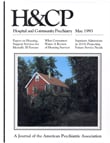Using Awareness of Religious Factors to Enhance Interventions in Consultation-Liaison Psychiatry
Abstract
Religion plays an important role in the lives of most Americans and often influences the ways patients react to medical illness. However, the religious aspects of patients' lives are often ignored or only superficially explored by consultation-liaison psychiatrists. Building on an existing typology, the authors use six dimensions of religious experience to discuss approaches to incorporating religious factors in the psychiatric evaluation and treatment of the hospitalized medical patient; the dimensions include religious beliefs, participation in religious rituals, and affiliation with a religious community. Case examples illustrate how these approaches can enhance the work of the consultation-liaison psychiatrist and improve the patient's coping ability.
Access content
To read the fulltext, please use one of the options below to sign in or purchase access.- Personal login
- Institutional Login
- Sign in via OpenAthens
- Register for access
-
Please login/register if you wish to pair your device and check access availability.
Not a subscriber?
PsychiatryOnline subscription options offer access to the DSM-5 library, books, journals, CME, and patient resources. This all-in-one virtual library provides psychiatrists and mental health professionals with key resources for diagnosis, treatment, research, and professional development.
Need more help? PsychiatryOnline Customer Service may be reached by emailing [email protected] or by calling 800-368-5777 (in the U.S.) or 703-907-7322 (outside the U.S.).



